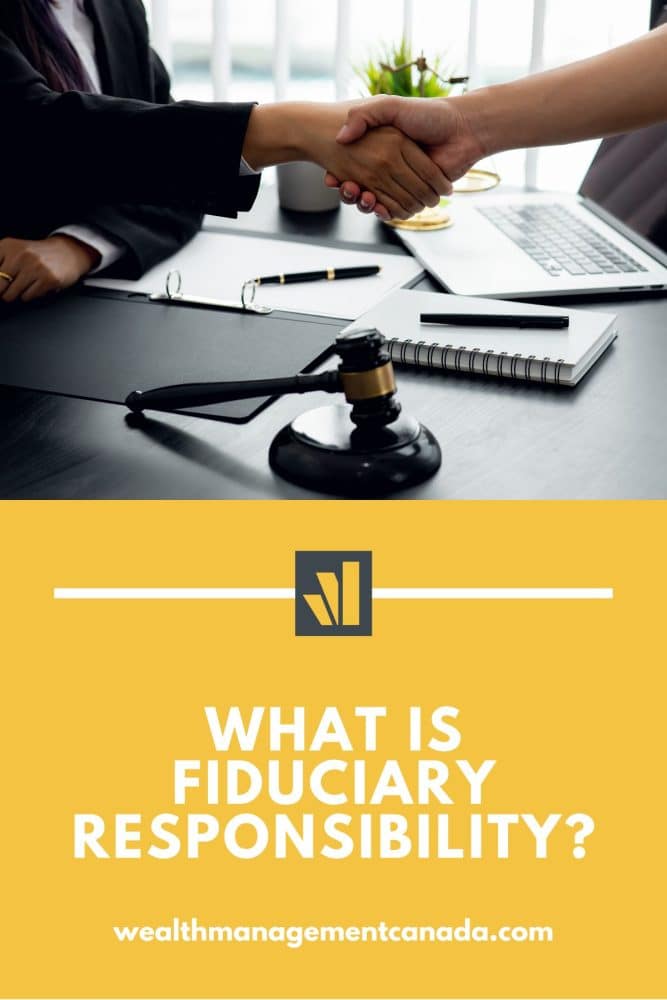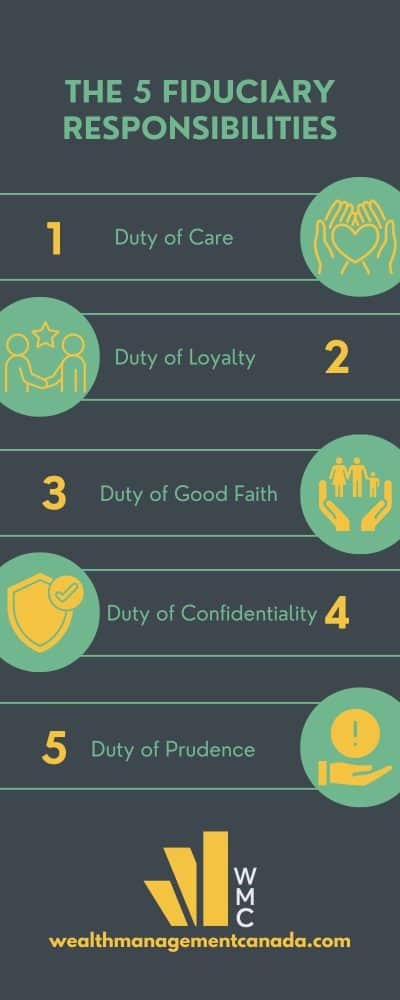Fiduciary responsibility is the legal obligation of an entity or person to act in the best interest of a beneficiary. There are many instances where fiduciary responsibility can arise. In fact, it may exist in more places than you think! If you’re interested in learning more about fiduciary responsibility and what it means for you, continue reading below. We will explore what is fiduciary responsibility, the specific elements and how conflicts can arise.

Table of contents
What is the meaning of fiduciary responsibility?
Fiduciary responsibility is the legal duty to behave in the best interest of another entity. More specifically, it’s the relationship between a fiduciary and a beneficiary which the fiduciary is acting on behalf of. A fiduciary accepts responsibility for duties of loyalty, good faith, care, confidentiality and more. Furthermore, it’s important there’s no conflicts of interest for the fiduciary so they can maintain integrity to their beneficiary.
Related Reading: Wealth Management and Independent Advice
What are the elements of fiduciary responsibility in Canada?
Fiduciary responsibility has more layers than simply legal obligation from a fiduciary to a beneficiary. Let’s take a closer look below.

What are the 5 fiduciary duties?
Generally speaking, these are the five fiduciary duties:
- Duty of Care. This is the responsibility of the fiduciary to inform and educate themselves to ensure appropriate decisions and judgments.
- Duty of Loyalty. Acting in the best interest of the beneficiary at all times, ensuring to put their well-being first. This also includes taking action when a conflict of interest arises.
- Duty of Good Faith. The responsibility to always behave within the law. At no point should the fiduciary take illegal actions to serve the beneficiary.
- Duty of Confidentiality. All information disclosed to the fiduciary from the beneficiary should remain confidential. In addition, fiduciaries have the obligation to disclose information to the beneficiary regarding conflicts of interest, problems and other details that impact their relationship.
- Duty of Prudence. Decision making and administration must be handled using professionalism, skepticism and caution.
Keep in mind that some of these responsibilities are more important in some instances over others. It’s up to the fiduciary to understand these concepts and apply them accordingly to protect the beneficiary. Finally, the role of a fiduciary involves discretion and experience to be truly effective.

START WORKING WITH A WEALTH MANAGER NOW
What is an example of fiduciary?
Fiduciaries pop up in a number of scenarios. Common examples of fiduciary responsibilities include doctor and patient, financial advisor and client, stockholder and company, attorney and client, and government and the public. In all of these cases, the first entity has a fiduciary responsibility to the second entity.
Related Reading: How to Invest in Real Estate Investment Trusts (REITs)
What is another word for fiduciary?
There isn’t exactly another word for fiduciary, but there are some common terms where fiduciary responsibilities arise. For instance, the guardian of a parent, the trustee of a trust, and executor of a will.
How do you know if someone is a fiduciary?
Many people are considered fiduciaries, however, that doesn’t mean it’s always easy to tell as an outsider. In fact, you might struggle to know while in such a relationship! Here’s some key indicators that someone is a fiduciary:
- Legal responsibility. If there is legislation surrounding a particular profession or job and how individuals must behave, then the person in that role would be a fiduciary. For instance, an appointed executor to a will has a legal responsibility to ensure assets are distributed according to the deceased’s wishes.
- Hired professional. If you’ve hired a lawyer, electrician or other professional, in most cases, a fiduciary responsibility arises. This is because you’re hiring a professional to fix a specific problem on your behalf in such a manner that benefits you.
- Certification. When someone has specific certification, they often must execute fiduciary responsibilities in accordance with the profession. For example, if you’re an accountant, you must follow fiduciary standards outlined by the profession, such as GAAP. You can usually verify someone’s certification using an online portal to determine whether they’re knowledgeable on fiduciary responsibilities or not.
- Communication. A fiduciary may inform you of their legal responsibility to you as a beneficiary. If this conversation never occurred, you can always ask the individual or entity for clarification. When in doubt, ask!
Keep in mind that the above are not hard and fast rules. In a perfect world, everyone would consider fiduciary responsibilities. This would omit conflicts of interest, lawsuits and exploitation, but unfortunately, that’s not the way the real world works. If your gut is telling you something is off with a fiduciary of yours, don’t ignore it. Try to figure out what’s going on and terminate the relationship with the fiduciary if needed.
What is the opposite of fiduciary?
The opposite of a fiduciary is a beneficiary. Alternatively, it’s anyone who doesn’t have a fiduciary responsibility. This could be a sales person, a friend, or your family. While we hope that these other entities will behave in our best interest, they have no legal obligation to do so!
What is the fiduciary responsibility of various entities?
As mentioned, there are tons of instances where fiduciary responsibilities can arise. Let’s look at a few specific cases below.
What is the fiduciary responsibility of a nonprofit board?
A nonprofit board is often brought together to oversee a specific issue of the nonprofit organization. This could be compliance to local law or ensuring restricted donor funds are used appropriately. The nonprofit board has a fiduciary responsibility to the organization and its donors. Board members cannot act in their own personal interest.
What is fiduciary responsibility in insurance?
Insurance is a sprawling industry whereby fiduciary responsibility can arise in a number of cases. However, insurance agents rarely are acting in your best interest and they do not have an obligation to do so. Rather, they are usually acting in the best interests of the insurance company. In other words, they’re attempting to earn the highest profits while insuring the least.
There is also fiduciary responsibility insurance. It is designed to protect a business from legal claims or obligations arising from fiduciary responsibility (or lack thereof). It is also called mismanagement, directors and officers (D&O) liability, or professional insurance.

START WORKING WITH A WEALTH MANAGER NOW
What is a real estate agent fiduciary responsibility?
The particulars of the law surrounding real estate agents can vary from province to province. But in general, real estate agents must act in the best interests of their clients. This means they cannot place the interests of the buyer or themselves above the client’s best interests.
Related Reading: How does life insurance work?
What is a fiduciary conflict?
Sometimes, fiduciaries do not carry out their legal obligation to a beneficiary. This can result in loss and pain. Ultimately, this can lead to fiduciary conflicts, such as lawsuits.
For example, if a doctor fails to properly diagnose a patient and the patient dies as a result, the doctor may have violated their fiduciary responsibility. The family and friends of the patient might even choose to sue the doctor or attempt to legally strip them of their license to practice medicine. As you can see, conflict absolutely can arise from failing to execute fiduciary responsibility.
Is fiduciary good or bad?
Ultimately, fiduciary responsibility is a good thing. It’s the culmination of laws, regulations and standards that are executed by a fiduciary to protect a beneficiary. And when things go wrong? The culmination of all these rules can be used to seek justice. Without fiduciary responsibility, beneficiaries may be lost and relying on people who don’t have their best interests at heart.
If you’re concerned as a beneficiary, ask your financial advisor, wealth manager or anyone else in your network for details about how they handle fiduciary responsibilities. Having a candid and open conversation about it can be a good way to establish trust. Or sometimes, it can reveal causes for concern and prompt you to find someone better.
Read More: Fiduciary Duty: What is it and what it means for your portfolio